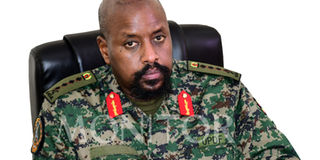Prime
Why Muhoozi keeps repeating his declaration to run for president

Gen Muhoozi Kainerugaba. PHOTO | FILE
What you need to know:
- The way Gen Muhoozi Kainerugaba repeats this declaration suggests two things: Either he is not sure of himself, or there is doubt or contest over his presidential interest and in repeating this ambition, he is trying to assert his claim to the office.
In a message on the social media platform Twitter on Wednesday night, March 15, President Museveni’s son, Gen Muhoozi Kainerugaba, declared that he will run for the presidency in 2026.
Not exactly breaking news, since he has stated this directly or indirectly and repeatedly since his public birthday celebrations last April.
Most people who follow the news or his tweets will feel they have heard this all before.
The question is: Why must he keep repeating this intention?
A politician announces once his or her intention to run for president or a parliamentary seat, then from the announcement goes about organising campaign staff, money, and schedules of rallies toward that end.
He does not keep repeating the declaration.
The way Muhoozi repeats this declaration suggests two things: Either he is not sure of himself deep down and must drum up this message as a way to gain self-confidence; or there is doubt or contest over his presidential interest and in repeating this ambition, he is trying to assert his claim to the office.
As this writer has stated in the Sunday Monitor on various occasions, there appears to be a rift within the First Family over who gets to succeed President Museveni, why, and when.
From the late 1990s until as recently as about 2019, it seemed a foregone conclusion that Muhoozi was his father’s anointed or preferred successor.
This was until Muhoozi got ahead of himself, power and privilege got to his head, and starting around this time last year, he began behaving more like a renegade son and army general than as an heir, respectfully supporting his father and earning the confidence of his father as a worthy successor.
From his erratic tweets to his openly and publicly defying his father’s advice on his public conduct and political utterances, Muhoozi embarrassed his father in public.
Several members of the Museveni family seem to agree with this reappraisal of Muhoozi. It’s no longer a given that he will be named the successor in 2026, 2031, or whenever Museveni intends to stand down from power.
An alternative succession plan is being considered and Muhoozi’s adamant declarations about one day becoming president of Uganda and “nobody can stop me!”, appears to be a response to the uncertain position he now finds himself in.
This, in summary, is the background to the constant insistence by Muhoozi that he will be Uganda’s next president and nobody can stand in his way.
This theme of a rift within the First Family requires some explanation that starts with a question.
Why, more than a year since the death of the Bank of Uganda Governor Tumusiime Mutebile, has President Museveni failed to find a successor for this crucial position in the Ugandan economy?
Is it because there is nobody qualified to be governor of the Central Bank?
This takes us back in history to the 1980s.
The army Chief of Staff, Maj Gen David Oyite-Ojok, along with other military officers, had died in a helicopter crash in December 1983.
For eight months until August 1984, President Milton Obote was unable to appoint a successor to Oyite-Ojok; or rather, the Defence Council was unable to agree on a successor.
In those days, it was the Defence Council rather than the head of State who appointed the chief of staff and the army commander.
However, the public perception was that President Obote was caught between powerful political and military factions and so was unable to appoint a new chief of staff who would be agreeable to most of these factions.
The UPC government was ridden with rival factions and disagreements.
Only in August 1984 was a new chief of staff, Col Smith Opon-Achak, named.
Similarly, the view today is that President Museveni is caught in the middle of competing interests and factions in the NRM government and his inability to name a successor to Mutebile in this important office is a reflection of the inner tensions in State House.
We see this factional fighting in the NSSF crisis. Conflicting messages and directives were issued over the renewal or not of the contract of the managing director Richard Byarugaba and allegations of corruption and misconduct within the NSSF.
The contestation over what to do with Byarugaba at NSSF gives us a glimpse into what must be taking place within State House and the upper ranks of the NRM government over whom to appoint as the new Bank of Uganda governor.
In conclusion, then, Gen Muhoozi Kainerugaba’s frequent assertions about running for president are more reflective of the frictions within his father’s inner circle than of his political ambitions.





